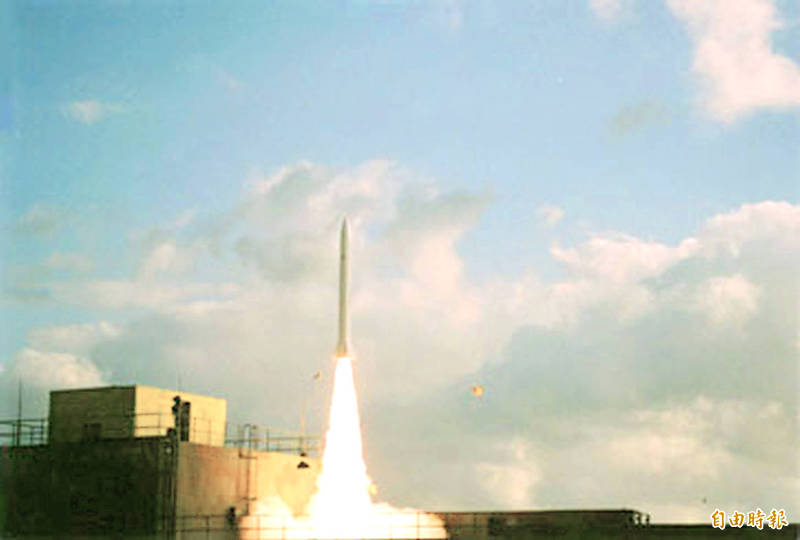《TAIPEI TIMES》 Institute denies security compromised

A Tien Kung missile is launched in an undated photograph posted on the Chungshan Institute of Science and Technology’s Web site. Photo: Yu Jui-jen, Taipei Times
FRAUD: The missile developer said it was aware of attempts by contractors to pass off inferior goods as original equipment and had taken steps to ensure quality control
By Jake Chung / Staff writer, with CNA
The Chungshan Institute of Science and Technology yesterday said that alleged fraud in the production of indigenous Tien Kung missiles (Skybow, 天弓) would not affect national security, after local media reported that local contractors had used poor quality Chinese-sourced materials.
Chinese-language Mirror Media magazine yesterday reported that local contractors involved in the production of Tien Kung missiles had used inferior-quality silicon controlled rectifiers (SCR) sourced from China, severely affecting missile capabilities.
The Tien Kung family of missiles, especially Tien Kung-III, is expected to become the nation’s main anti-aircraft platform, and if they were unable to launch as a result of poor components, it would heavily compromise national security, the magazine said.
The institute said that it had discovered the attempts to pass off inferior goods for original equipment in March last year.
It refuted the magazine’s report that the incident has affected national security, saying that it has implemented existing measures that would minimize the incident’s effect on arms production and other projects.
The institute said that it had reached out to US-based Semitronics Corp, the only company capable of manufacturing SCRs used in the Skybow missiles to military specifications, and that both sides agreed to implement measures that would facilitate the institute’s efforts to confirm that the products originated from Semitronics.
The managers of contractors Onsen Taiwan Cosmetics Corp (昂神國際) and Burnaby Light Technology Corp (勳章科技) — Chen Ching-mao (陳清茂), 55, and his sons, Chen Yen-chang (陳彥璋), 31, Chen Yen-hsun (陳彥勳), 28 — were indicted on fraud and forgery charges last year.
The Chens had first delivered to the institute 84 Semitronics-manufactured SCRs, but its later deliveries were inferior stock from China, prosecutor reports showed.
The Chens falsified device serial numbers and import papers to skim money off the project, making NT$100 million (US$3.59 million) from the deals, the reports said.
“We welcome all business owners to invest in the national defense sector and be a part of building an autonomous national defense industry,” the institute said, adding that it would tighten oversight and management measures to ensure that all projects produce high-quality results on time.
The Legislative Yuan on Jan. 11 approved the Government’s Special Budget for Procurements to Enhance Combat Capability for the Navy and the Air Force (中央政府海空戰力提昇計畫採購特別預算案), totaling NT$236.96 billion.
Under the law, the Ministry of National Defense was expected to draft regulations to prevent contractors from using Chinese goods and to brief the legislature of said regulations within a month of the budget’s approval.
A separate addendum, citing how 19.8 percent of goods provided by contractors in 2020 were flawed, demanded that the ministry and the institute implement quality-control measures for their contractors.
As of press time last night, the ministry had not delivered the draft to the legislature.
The institute admitted that the SCRs were used in other missiles outside of the Tien Kung family of missiles, but declined to name the type of missiles affected, citing classified data.
Allegations that the Taiwanese military had been “unable” to track Chinese People’s Liberation Army ship and plane movements in 2020 were baseless rumors, the institute added.
The institute had discovered attempts to pass off inferior-quality SCRs as Semitronics-manufactured SCRs during quality control, adding that the components had never been installed in the missiles, said a source who spoke on condition of anonymity.
Additional reporting by Yu Jui-jen, Wu Su-wei and Aaron Tu
新聞來源:TAIPEI TIMES
















